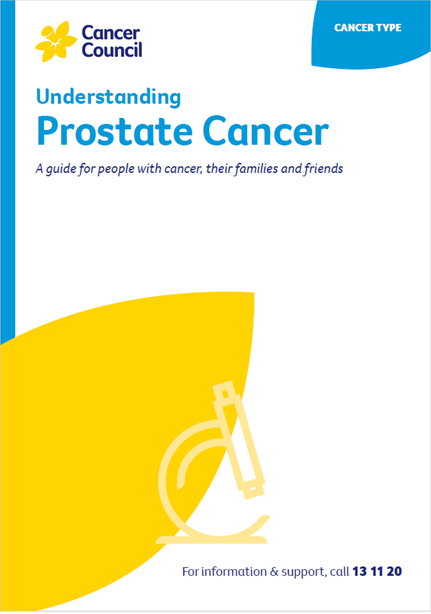- Home
- Prostate cancer
- Diagnosis
- Your health care team
Your health care team
Your GP will arrange the first tests to assess your symptoms. If these tests do not rule out cancer, you will usually be referred to a specialist, who will arrange further tests.
Prostate cancer is usually diagnosed by a urologist, who will talk to you about your surgical or other options. You will usually also see a radiation oncologist to discuss radiation therapy. You may also be referred to a medical oncologist, who will discuss drug treatments. It’s important to find out all your options before making a decision.
Your specialists will discuss treatment options with other health professionals at what is known as a multidisciplinary team (MDT) meeting. During and after treatment, you will see a range of health professionals who specialise in different aspects of your care.
To find cancer specialists, multidisciplinary teams and hospitals in NSW or ACT, you can visit the NSW Government website CanRefer.
Health professionals you may see
| GP | assists you with treatment decisions and works in partnership with your specialists in providing ongoing care; may monitor PSA levels and administer treatment |
| urologist | treats diseases of the urinary system and the male reproductive system, including prostate cancer; performs surgery |
| radiation oncologist | treats cancer by prescribing and overseeing a course of radiation therapy |
| radiation therapist | plans and delivers radiation therapy |
| medical oncologist | treats cancer with drug therapies such as chemotherapy, hormone therapy and targeted therapy (systemic treatment) |
| endocrinologist | diagnoses, treats and manages hormonal disorders, including osteoporosis |
| cancer care coordinator, prostate cancer specialist nurse | coordinate your care, liaise with MDT members, and support you throughout treatment; may be a clinical nurse consultant (CNC) or clinical nurse specialist (CNS) |
| nurse | administers drugs and provides care, information and support throughout management or treatment |
| nuclear medicine specialist | analyses bone scans and PET scans and delivers radionuclide therapies |
| radiologist | analyses x-rays and scans; an interventional radiologist may also perform a biopsy guided by ultrasound or CT, and deliver some treatments |
| continence nurse | assesses bladder and bowel control, and helps you find ways to manage any changes |
| continence physiotherapist | provides exercises to help strengthen pelvic floor muscles and improve bladder and bowel control |
| exercise physiologist | prescribes exercise to help people with medical conditions improve their overall health, fitness, strength and energy level |
| occupational therapist | assists in adapting your living and working environment to help you resume your usual activities after treatment |
| sex therapist, sexual health physician | help you and your partner with sexuality issues before and after treatment; an erectile dysfunction specialist can give advice about erection problems |
| psychologist, counsellor, psychiatrist | help you manage your emotional response to diagnosis and treatment; may also help with emotional issues affecting sexuality |
| Aboriginal and Torres Strait Islander liaison officer | if you identify as Aboriginal or Torres Strait Islander, supports you and your family during treatment and recovery |
| social worker | links you to support services and helps you with emotional, practical and financial issues |
| palliative care specialists and nurses | work closely with your GP and cancer team to help control symptoms and maintain quality of life |
→ READ MORE: Management and treatment of prostate cancer
Podcast: Coping with a Cancer Diagnosis
Listen to more of our podcast for people affected by cancer
Video: Coping with emotions after a cancer diagnosis
More resources
Prof Declan Murphy, Consultant Urologist, Director – Genitourinary Oncology, Peter MacCallum Cancer Centre and The University of Melbourne, VIC; Alan Barlee, Consumer; Dr Patrick Bowden, Radiation Oncologist, Epworth Hospital, Richmond, VIC; Bob Carnaby, Consumer; Dr Megan Crumbaker, Medical Oncologist, St Vincent’s Hospital Sydney, NSW; Henry McGregor, Health Physiotherapist, Adelaide Men’s Health Physio, SA; Jessica Medd, Senior Clinical Psychologist, Department of Urology, Concord Repatriation General Hospital and Headway Health, NSW; Dr Gary Morrison, Shine a Light (LGBTQIA+ Cancer Support Group); Caitriona Nienaber, 13 11 20 Consultant, Cancer Council WA; Graham Rees, Consumer; Kerry Santoro, Prostate Cancer Specialist Nurse Consultant, Southern Adelaide Local Health Network, SA; Prof Phillip Stricker, Chairman, Department of Urology, St Vincent’s Private Hospital, NSW; Dr Sylvia van Dyk, Brachytherapy Lead, Peter MacCallum Cancer Centre, VIC.
View the Cancer Council NSW editorial policy.
View all publications or call 13 11 20 for free printed copies.

